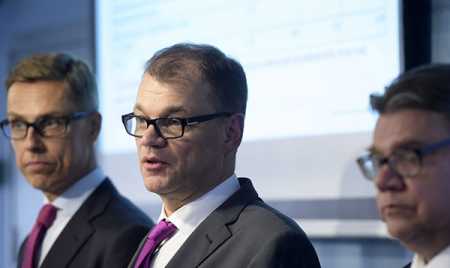|
Wed, 09 Sep, 2015 12:50:26 AM Govt announces proposal for cost competitiveness FTimes Report, Sep 9  Finance Minister Alexander Stubb, Prime Minister Juha Sipilä (center) and Minister of Foreign Affairs Timo Soini spoke on the competitiveness proposal at a press conference in Helsinki on Tuesday. Photo – Lehtikuva. The government on Tuesday announced a proposal to improve cost competitiveness by changing Epiphany and Ascension Day into unpaid public holidays without reducing annual working time.
The objective of the proposal is to raise the employment rate to 72 per cent and the number of employed people by 110,000 by the end of the parliamentary term, said a government press release.
The debt-to-GDP ratio will level off by the end of this government’s term and living on debt will be brought to an end by 2021.
The benefit level for sick days will also be reduced so that the first day will in future be unpaid and 80 per cent of pay will be paid for days 2-9.
Overtime pay will be halved and Sunday pay will be reduced to 75 per cent while long holidays, particularly in the public sector, will be shortened from 38 to 30 working days.
The private employer’s social security contribution will be reduced by 1.72 percentage points from the beginning of 2017.
According to Prime Minister Juha Sipilä, the government’s solutions are essential to improve Finland’s competitiveness.
A particular challenge is the EUR 10 billion sustainability gap. The government has decided to cover four billion with savings, around four billion with structural reforms and the remainder with measures to improve competitiveness, which include improving cost-competitiveness, pay moderation and improving productivity.
Following the termination of the social contract negotiations, the government, due to the very poor economic situation, has had to identify exceptional measures to reduce unit labour costs by five per cent and enhance workers’ change security, said the press release.
The proposal includes offering workers of companies employing more than 20 people, alongside redundancy pay, the right to re-employment training, with a value at least equal to the company’s average monthly pay.
In a company employing more than 20 people, the employer must provide occupational healthcare services for a six-month period after redundancy.
Young women’s employment will be promoted by equalising the costs arising to employers from family leave, with a lump sum of EUR 2,500.
“These proposals are aimed at restoring our eroded competiveness. Fundamentally, it is a question of creating more jobs and thereby maintaining, even rescuing, the Finnish welfare society,” the prime minister said.
This is the proportion of working people required to put Finland back on track in this serious situation, said Sipilä.
The intention is to implement the proposals through mandatory legislation to be applied after the end of current collective bargaining agreements.
The legislation will come into force at the beginning of the next collective bargaining agreement period. The measures to be enacted will be precise and well defined.
The government discussed the proposals with social partners before their publication and will continue these talks in the Economic Council on Wednesday.
After the council meeting, the government will have an informal meeting to make a decision on its measures.
The parliamentary groups of the three-party ruling alliance components ¬– the Centre Party, the Finns Party and the National Coalition Party – have for their part, approved the proposed measures.
Necessary legislative drafting will take place as usual in cooperation with the social partners.
In addition, the government has assessed the impact of the measures in terms of non-discrimination and gender equality.
The prime minister will submit the proposal to parliament in the form of a government statement by the end of this month.
The aim is to make the legislative amendments necessary by June 2016 at the latest.
News agency STT adds: The chair of the main opposition Suomen Sosialidemokraattinen Puolue (Social Democratic Party of Finland), Antti Rinne has questioned the constitutionality of the government package on improving competitiveness.
According to Rinne, the cuts target the existing labour and collective labour agreements. The measures include, for instance, reducing annual holiday, halving overtime pay as well as cutting Sunday and leave sick pay.
More News
|
|
Finland Times
| Thursday, 25 April, 2024 |

